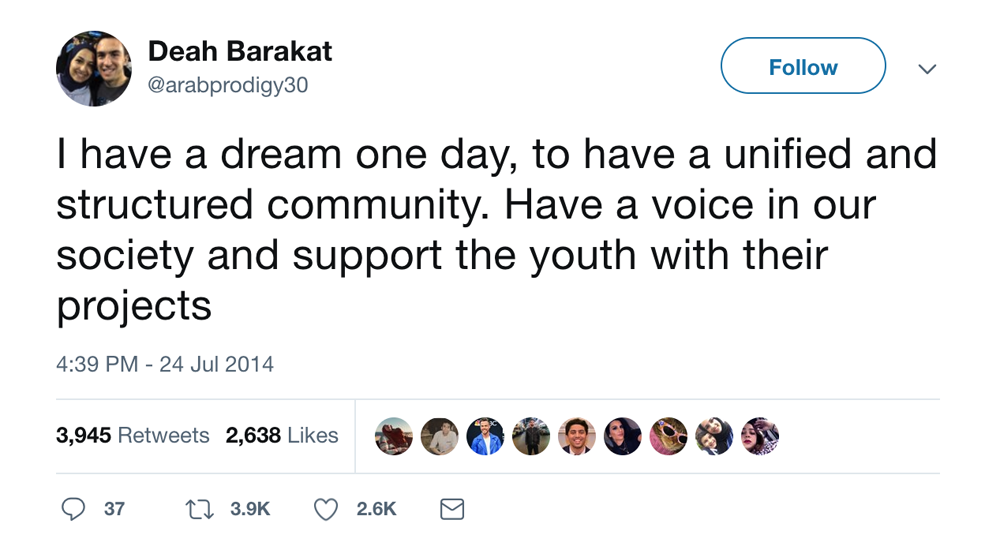After the tragic murders of Deah Barakat, Yusor Abu-Salha, Barakat’s wife, and her sister Razan Abu-Salha, their families chose to honor their lives by bringing the community together through The Light House Project.
The Light House Project was started by Farris Barakat, Deah’s brother, after his murder. Barakat said, that the project is based out of a house originally owned by Deah, who only owned two things at the time of his murder: a car and the house, which was being rented out. After his death, the property was inherited by Barakat’s mother and father.
“I started reflecting on the murders and I guess there was a lot to be done in terms of continuing to share their story as an educational moment for Americans and just the importance of this moment in our history,” Barakat said. “There was a lot of commitment from people on what they want to do [for them]. It was a matter of organizing that and doing something that is sustainable, doing something that will exist long term.”
Barakat began thinking of different things the space could be used for, such as a shelter for women, an office space or resource center. In the midst of renovations to get the property up to commercial code, Barakat’s mother shared an old message tweeted by Deah, that expressed his wishes for young people in the community. The tweet inspired Barakat to create The Light House Project and use the house as a place for young people to grow their ideas.
He also mentioned that the name of the center came from Barakat’s brother’s name ‘Deah’ which translates to ‘light’ from Arabic.
“The idea was to help them come up with a business plan and try to come up with how this works,” Barakat said. “We ended up on a model where we will essentially run an incubator program. An incubator program essentially [is] going to help foster the growth of non-profit programs related to youth, so it’s literally helping the youth with their projects, allowing them to use their own brand, their own marketing, they feel completely empowered and owning of their projects.”
The Light House Project and the incubator program support young individuals’ projects by offering them financial support and resources such as the office’s space and mailing address.
“It gives them a springboard to launch from and it’s a way to come together and organize with other projects working out of the house,” Barakat said.
Barakat expanded and said that at one point The Light House Project wanted to share the story of Deah, Yusor and Razan but that soon became part of the mission of the Our Three Winners Foundation, another project started by the family to prevent hate violence from occurring by tackling implicit biases.
Barakat described the main goal of The Light House Project as being focusing on community outreach in the Triangle area. Since 2012, the house’s purpose has been fully cemented toward fulfilling that goal, according to the organization’s website.
The Light House Project also runs additional programs to promote growth and entrepreneurship, such as the Interfaith Food Drive that occurs every year in February.
Shadi Sadi, a volunteer with The Light House Project and director of the Food Drive, talked about the progress made every year in terms of community engagement.
“The first year we did it donations had translated into 21,000 meals and then the last two years we have had over 50,000 meals donated,” Sadi said. “I think the grand total of the last four years was 166,000 meals, so we’ve definitely grown. I feel like more people learn about it and more people are signing up, it’s just growing beyond what we could imagine and it’s just touching so many people.”
Sadi said that the Food Drive is a way to unite people that have been affected by various tragedies by sharing their stories with one another.
“It’s important for people to find a common ground and see a common cause that we can all work towards,” Sadi said.
Barakat talked about the purpose of creating the Project, expressing how he believes that in order to live in a better world, the community must work for it.
“For me, it’s putting faith into action,” Barakat said. “We all talk about how we care for each other, we talk about [how] we want what’s best for each other, we talk about that stuff, but putting that stuff into action, once you do that then you know that’s genuine and that’s real and that grows and you’re more committed to that you’re more a person that cares about other people and is involved.”
Several religious communities from all around Raleigh have come together in support of the food drive, according to Sadi, including Christian churches, all of the synagogues in the Triangle and the Sikh community. Additionally, the NC State School of Design and for the first time, the UNC School of Dentistry, have joined the drive.
The impact of the deaths of Deah, Yusor and Razan have made the community self-reflect and take action to see true change, according to Sadi.
“This tragedy made us take a step back and say ‘What are we doing with our lives? We know we are supposed to be doing something, but are we doing it,’” Sadi said. “That’s why, for me, something like the food drive makes sense that we should be stopping everything and working towards these common goals that benefit society and really our religion kind of commands it.”
Anyone interested in participating in the Food Drive can donate online or at the Islamic Center of Raleigh until March 2, 2019.
The Light House Project is an initiative started to honor Deah Barakat, Yusor Abu-Salha and Razan Abu-Salha. The project recently converted a downtown Raleigh house into an office and community resource.









